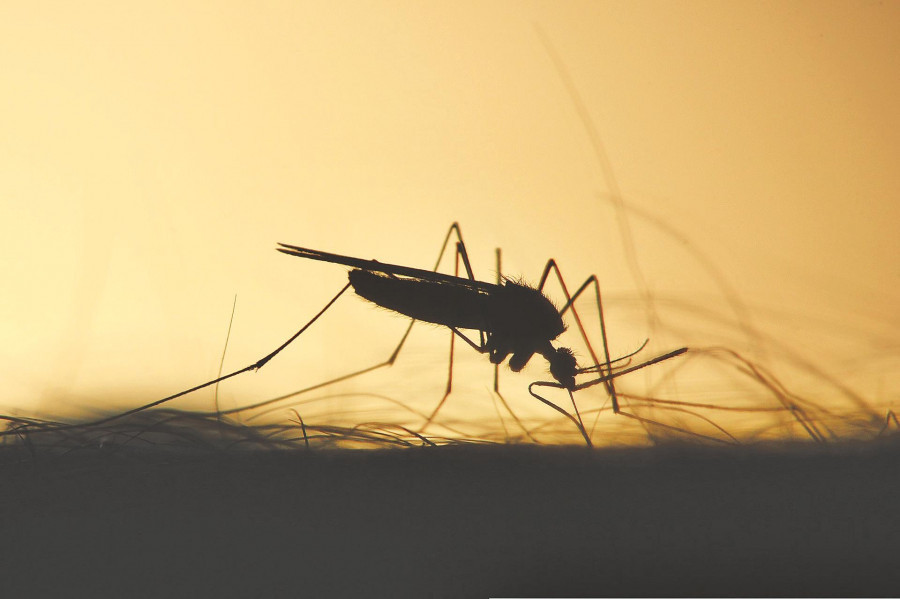Health
Dengue spreads to 66 districts: One person dead, over 1,200 test positive
Deceased is a 30-year-old man from Dharan. The three districts of Kathmandu have reported dengue cases too.
Arjun Poudel
At least one person died and hundreds of people have been infected with the dengue virus over the past two months. Officials said the disease has spread to 66 districts and over 1,200 people have tested positive for the virus since January.
The death and most of the infections were recorded over the past few weeks. According to the Epidemiology and Disease Control Division, the federal agency responsible for containing outbreaks and epidemics in the country, a 30-year-old man from Dharan, who tested positive for dengue infection, died of complications last month.
“This is the first confirmed death from dengue infection in 2023,” said Dr Gokarna Dahal, chief of the Vector Control Section at the division. “As the monsoon has just set in, many people could get infected with the deadly virus in the coming days.”
According to the division, Dharan Sub-metropolitan City has reported 122 cases of dengue infection so far. The real number of infections could be several times higher, as the case reporting system of the government is not very effective.
All three districts of the Valley—Kathmandu, Lalitpur and Bhaktapur—have reported dengue cases.
Monsoon in Nepal is a season of epidemics when thousands of people across the country get infected with water-borne and vector-borne diseases.
Although the post-monsoon time is considered the peak season for dengue transmission, the country has witnessed outbreaks of the deadly disease since the start of the year. Experts say the virus has become endemic, as the cases of dengue infection are being reported throughout the year.
Experts say the reported dengue cases could be just the tip of the iceberg, as around 90 percent of the infected people do not show any symptoms.
Last year, at least 88 people died and more than 54,000 were infected with the virus, which had spread to all 77 districts of the country. Hospitals in the Kathmandu Valley were overwhelmed with dengue patients and many complained that they were deprived of treatment. Pharmacies also lacked paracetamol, the most widely used medicine to treat fever, at the time.
The number of deaths from dengue infection in Nepal is considered too high.
Negligence in case management, not taking preventive measures, lack of public awareness of the risks, and delays in seeking healthcare services after catching the infection are among the reasons for the high death rate from the virus, according to experts. Dengue virus serotype DENV-1, DENV-2, and DENV-3 were found responsible for the dengue epidemic in the country.
In 2019, the disease had gripped 68 districts and six people had died and more than 16,000 were hospitalised. The outbreak of the virus first started in the Dharan Sub-metropolis.
Entomologists warn that the dengue spread could surge again, as no serious initiatives have been taken to destroy the eggs of infected mosquitoes.
“We have alerted all agencies in districts about the outbreak of the dengue virus, and have urged them to begin a mosquito ‘search and destroy’ drive,” said Dahal. “Testing kits have been supplied and an orientation for health workers has been completed. We have also launched an awareness drive. And some local units including Dharan Sub-metropolis have already started a search and destroy drive.”
Dengue is a mosquito-borne disease transmitted by female Aedes aegypti and Aedes albopictus mosquitoes. The same vector also transmits chikungunya, yellow fever, and Zika, according to the World Health Organisation.
According to doctors, mild to high fever, severe muscle pain, rashes, severe headache, and pain in the eyes are some of the symptoms of dengue, and treatment should be sought immediately, if anyone experiences those symptoms. While there is no specific cure for the disease, early detection and access to proper medical care can lower fatalities.
Dengue-transmitting mosquitoes breed in clean water and bite people in daylight. Uncovered water tanks and discarded plastic cups and bottles could become breeding grounds for the dengue-carrying mosquitoes.
Experts say unless the general public themselves become conscious and take the initiative, the spread of the dengue virus cannot be controlled.
“Without public support, it is impossible to control dengue spread in communities,” said Dr Sher Bahadur Pun, chief of the Clinical Research Unit at the Sukraraj Tropical and Infectious Disease Hospital. “Local units must take the initiative and start immediate action—“search and destruction” of the breeding sites of dengue-spreading mosquitoes. If more time is taken to take measures against the dengue virus, we will have a repeat of the situation of 2022,” warned Pun.




 15.12°C Kathmandu
15.12°C Kathmandu















